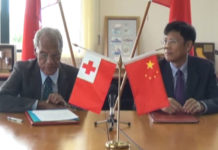By Sione Tu’itahi
(Educator, writer and Executive Director of the Health Promotion Forum of New Zealand)
Building a nation begins with the kāinga or extended family. As mentioned in my second column, the kāinga is the smallest unit, but the most important building block of society. The kāinga is the foundation. Expand the family and you will have the village. Expand the village and you will have the nation. Expand the nation and you will have the world.
From a Tongan Indigenous perspective, the kainga is the first house of learning, the first house of worship and the first house of healing. Through their words and actions, the parents are the first teachers, the first priests and the first healers. They are the first leaders who should lead by example. Great Tongan nation builders of past centuries and decades came from kainga where good governance and leadership have become inter-generational strengths and wisdom.
Tufunga Fonua is a Tongan term that refers to nation building, the focus of this third column. Tufunga means to build, while fonua means people and their environment. Fonua is a Tongan socio-ecological theory that articulates the oneness and inseparability of humans and their environment. It is a Tongan Indigenous philosophy that can offer solutions to the global challenges that we face as a global community, such as climate crisis and sustainable development.
Fonua encompasses the physical, mental, spiritual, cultural, socio-economic and ecological dimensions of life and wellbeing. It is the framework through which Tongans view the full cycle of life – from birth to death, and from maintaining relationship, tauhi va, to sustaining community, tauhi fonua.
Certain processes in the Tongan culture and elements in the Tongan Language illustrate the significant influence of the fonua construct in Tongan thinking and socio-political and economic organisation. For example, as part of the natural cycle of human life, in the world of the womb, the baby is sustained by her fonua, the placenta. The baby is later born into the fonua (land), where she experiences life and builds relationships with the fonua – the entire ecology, including its human inhabitants. As part of the birth process, the remains of the fonua (placenta) that sustained the baby are returned by burial to the fonua (physical land).
Once the pito (umbilical cord that connects the baby to the fonua, placenta) falls off, it is also returned to the fonua (physical land) through a similar burying ritual. Upon her death, she is returned to her fonualoto, (land within the land), or her grave. Meanwhile, when she dies, her spirit ascends to the fonua kaha’u or langi – the spiritual abode.
In short, there are four fonua that are of great significance to the Tongan cycle of life – fonua in the womb, fonua on this plane of existence, fonua for our earthly remains and fonua for the soul.
Fonua also provides four phases as a framework for Tongans for understanding social evolution and social action. These four are Fekumi Fonua, Langa Fonua, Tauhi Fonua, and Tufunga Fonua.
When existing values, institutions and practices no longer cater adequately for their needs and aspirations, Tongans begin to look for new principles and new physical and social environments that can meet their needs. This is the phase of Kumi Fonua or seeking a new life. Migrating to other nations in the 1960s is an example of Kumi Fonua.
Once they arrive, they set out to build their new environment. This is the Langa Fonua or community building phase. As they begin to settle and life in the new home becomes normal, they continue to maintain and sustain their new environment. This is the Tauhi Fonua or community sustaining phase.
In time the community grows and new social realities came into existence, which require a re-thinking of the existing order. This is the fourth stage, Tufunga Fonua or re-thinking, of the existing order and the cyclic framework of Fonua.
In general, Tonga is going through a Tufunga Fonua phase as it passes through the mid-term point of the first quarter of the 21st century. Transformational changes can be observed in all spheres of life, from governance and leadership in all sectors to its economy and cultural values and practices, while it is increasingly nested within our globalised society.
Transformational changes call for transformational leadership in all aspects of Tongan society. Transformational leadership is visionary leadership that unequivocally disregards self-interest for the collective good. It is ethical leadership where justice, love, unity in diversity and the material and spiritual prosperity of all is the ultimate goal. It is effective leadership where leaders walk their talk and lead with humility and by example. Re-thinking Tongan leadership – its many forms and levels – can be a timely new year resolution for all.







